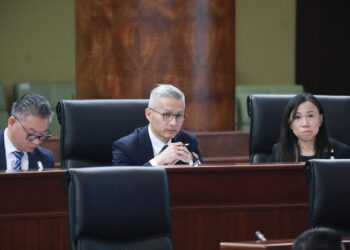The former CEO of leading Macau junket Tak Chun Group, Levo Chan, has been sentenced to 14 years in prison by a Macau court.
Chan was sentenced by the Court of First Instance on Friday morning, which found him guilty on all counts following more than four months of deliberation. Those charges included 24 counts of illegal gambling in a licensed area, seven counts of substantial fraud, one count of illegal gambling and aggravated money laundering.
Specifically, Chan was sentenced to 10 years for criminal association, one year for each of 24 counts of illegal gambling in a licensed area (24 years), six years for each of seven counts of substantial fraud (42 years), 1.5 years for illegal gambling and five years for aggravated money laundering.

His total sentence came to 82.5 years, however because of local laws regarding combined punishment for several crimes, the judge settled on a final sentence of 14 years in prison.
Chan is the second former head of a leading Macau junket to be sentenced to prison this year after Suncity’s Alvin Chau was given 18 years in January on a similar array of charges.
The Chan case involved nine defendants, including Chan himself as well as Wong Pui Keng, Cheong Sao Pek, Lio Weng Hang, Chan Kam Chi, Lee Tat Chuen, Choi Wai Chan, Li Manxing and Tan Guichang.
Of these, Wong Pui Keng, Cheong Sao Pek, Lio Weng Hang and Lee Tat Chuen were sentenced to 10 years, 10 years, 11 years and 7 years imprisonment respectively.
Chan Kam Chi, Choi Wai Chan, Li Manxing and T Tan Guichang were acquitted of their charges.
The Macau government has also ordered repayment of MOP$570 million (US$70.5 million) in compensation from Chan and others.
This included compensation to five concessionaires who previously worked with Tak Chun – Galaxy Entertainment Group, MGM China, Sands China, SJM and Wynn Macau. The five had sought a combined MOP$204 million (US$25.3 million) with Galaxy claiming MOP$81.2 million (US$10 million), Wynn claiming MOP$36.8 million (US$4.6 million), Sands claiming MOP$47.0 million (US$5.8 million), SJM claiming MOP$35.7 million (US$4.4 million) and MGM claiming MOP$3.8 million (US$474,000).
The judge pointed out in court that, after consideration by the court and hearing evidence from Tak Chun’s employees, Tak Chun had engaged in “betting under the table” activities in Macau VIP rooms.
“Computer evidence showed that Tak Chun had recorded the activities of the betting under the table companies at Tak Chun and that they promoted betting under the table games to their customers,” the judge said.
“Some of the persons from the betting under the table companies were present at the Tak Chun Group (VIP lounge), conducted betting under the table for players and recorded information on [these activities].”
Chan was originally charged with 39 counts of illegal betting in a licensed area, but was eventually convicted of 24 counts by the court.
The court also noted that the defendant had received at least MOP$1.5 billion (US$186 million) in illegal proceeds from betting under the table.
In relation to the charge of defrauding the government and the six concessionaires, the court held that the concessionaires and the government suffered losses as a result of this betting under the table behavior, which concealed actual turnover.
In relation to internet betting or telephone betting (illegal gambling offences), the court noted that, according to witness evidence and computer records, Tak Chun Group had close links with telephone betting companies, and that extensive telephone betting records and customer information were found on Tak Chun’s computers.
On aggravated money laundering, the court found that there were strong indications that Chan had used the account of Tak Chun to disguise ill-gotten gains and then transferred some of the proceeds to his personal bank account, allegedly in breach of money laundering laws.
As for the triad offence, the court noted that the crime of criminal association is the basic offence of triad society and that if the defendant used the criminal association to obtain unlawful gains, it would be a triad offence. The court found that Chan created and led a criminal syndicate to carry out unlawful acts such as telephone betting and betting under the table, which is a triad offence.



































